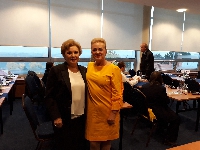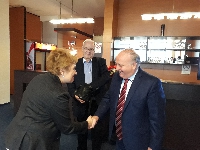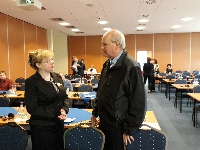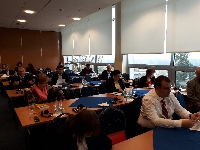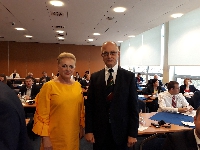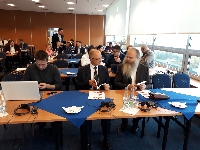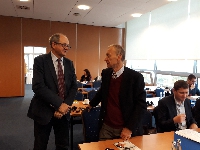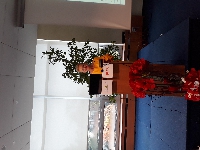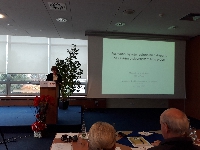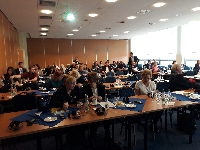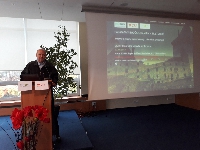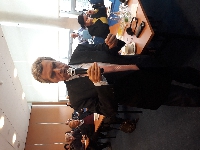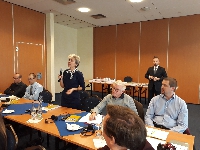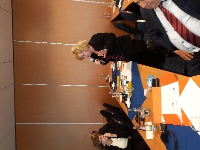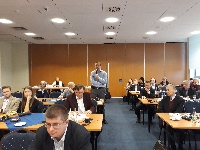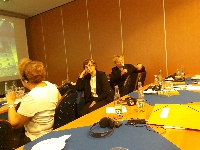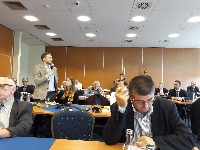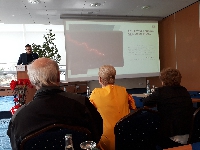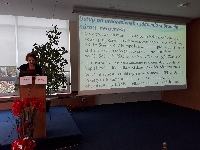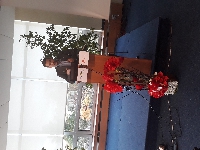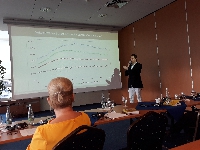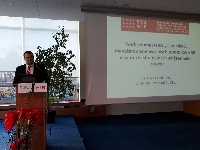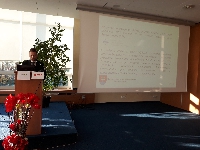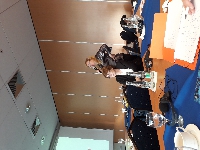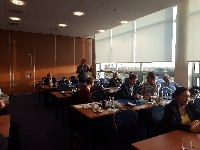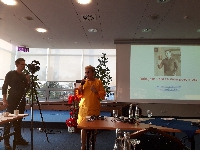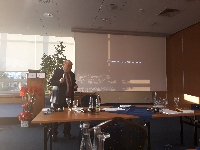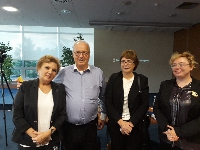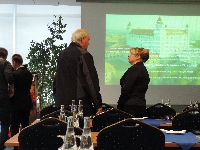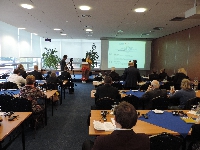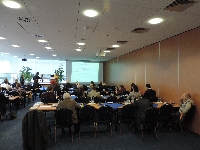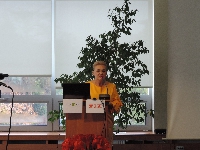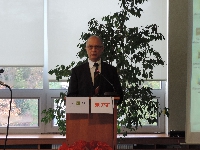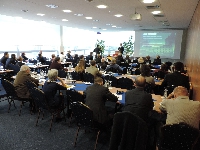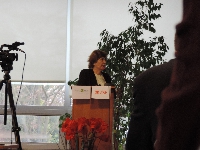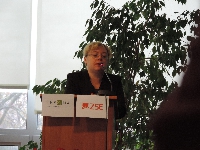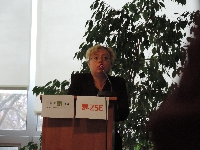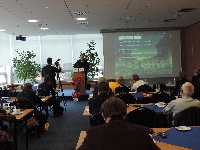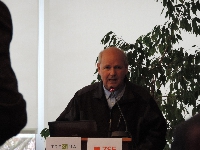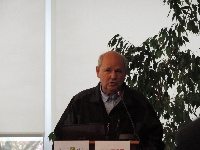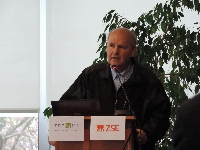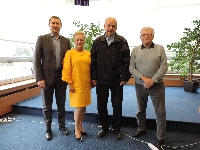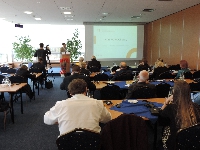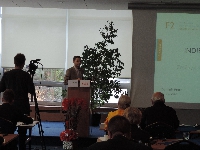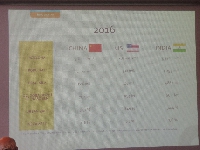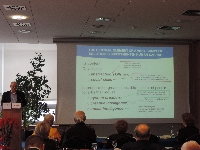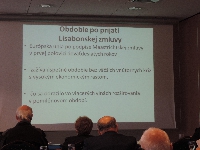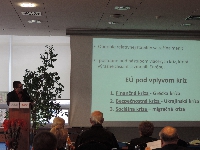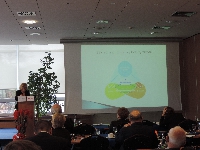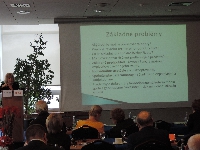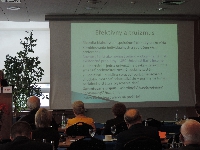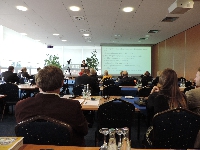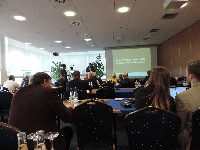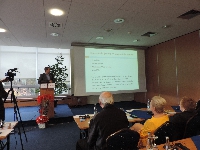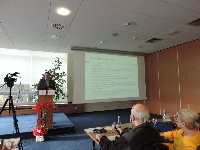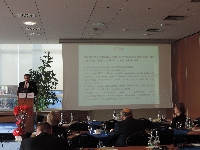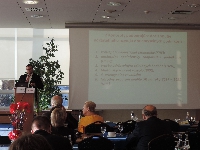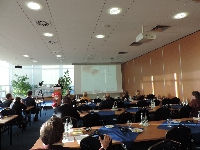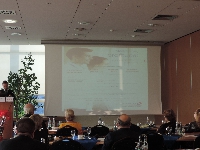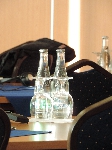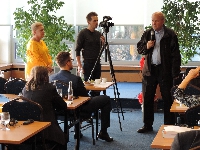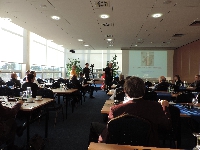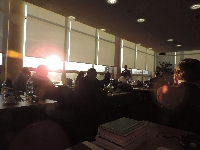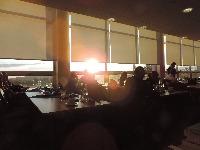On 27th October 2017 was held VII. International Scientific Conference Paradigms of future changes in the 21st century: External and internal determinants of society polarization at the SOREA Regia Hotel in Bratislava. Co-organizers of the conference were: the Faculty of Economics of the Technical University in Kosice, the Faculty of Materials Science and Technology of the Slovak University of Technology in Trnava, Institute for Social and Economic Research of Ufa Scientific Center of Russian Academy of Sciences and the Institute of Economics and Management of The Ufa State Aviation Technical University.
The conference was organized with the financial support of Trexima, s.r.o. and Západoslovenská energetika E-on a.s. The conference was attended by approximately 70 participants. We would like to thank not only the sponsors but also our colleagues from the cooperating institutions for their support and help in organizing on the day of the conference.
Gestor of the conference doc. Ing. Iveta Pauhofová, CSc. visiting professor, conceived the conference primarily with a focus on current knowledge of the impact of technological changes on the labor market and society, on inequality, poverty and social parasitism, the context of society polarization and human health and the management of the economy.
At the beginning of the conference participants were welcomed by doc. Ing. Iveta Pauhofová, CSc. visiting professor, who also moderated the whole conference. Mr. Gejza Mihály, chief executive officer of TREXIMA, also had a welcoming speech, as a representative of the co-operating institution. Mr. Andrej Šabanov, ambassador of the Russian Federation in Slovakia, greeted the conference and expressed necessity about the need of further conferences.
In the plenary part of the conference, the first speaker was doc. Ing. Magdalena Kotýnková, CSc. from University of Economics in Prague, Czech Republic, with contribution „Comparison of the development of regional disparities in the Czech and Slovak labor market”. Regional labor market disparities reflect not only the geographical distribution of the labor force, demographic development, economic structure, development of employment structure, but are a mirror of the potential of internal tension in the economy and society in the regional sphere. It is obvious that understanding of this issue in the classic assumption of regional economics does not suffice and is necessary to deal with how contemporary reality, characterized by economic inequalities and social tensions, get into balance. The priority is to focus not only on the effective use of potential, but do not forget to an adequate use of human potential in regions. What is happening in the labor market, in regional labor markets, has important systemic connections and impacts not only on local demand and business development but mainly on the life of an individual, an employed person, an unemployed person, a child or a pensioner. The second speaker was the Czech economist and politician doc. Ing. Ilona Švihlíková, PhD. from the Jan Amos Komensky University of Prague, Czech Republic, who presented the topic “Technological change: Socio-economic impacts”. Nowadays, it is no longer possible to deny that technological change will be one of the key factor of the future. We can say that it’s the mirror, which has been set up by the 4th Industrial Revolution of the Society. The mirror, in which all the absurdities of today's society are seen, from polarization to the inability of using human potential. Technological changes can bring some positive results, but they can also make many inequalities. In this context, it is necessary to realize that the processes are very fast and there is little time for adaptation. While in EU countries there has been a reconciliation with the aging trend and labor migration, mobility is greatly supported, in the Russian Federation, they have begun intensively deal with how the human potential can be strengthened from the social point of view, especially in the area of health, education and ecology so that society in the future won´t become dependent on foreign workers. This is connected with the need to maintain the real functionality of the various RF regions and preserve them for the future. Conjunction of population aging and leaving the region is a significant determinant of raising demographic problems within the region. A comprehensive strategy and the allocation of sufficient financial resources are important. This issue was addressed by prof. Ing. Lilija Bucharbajeva, DrSc. from Institute of Economics and Management USATU in Ufa, Russian Federation. The topic was “Spatial polarization in the sphere of saving the population and its determinants”. The last speaker in the plenary part of the conference was prof. Ing. Peter Staněk, CSc. from the Institute of Economic Research SAS in Bratislava, Slovak Republic. The topic was „Society 5.0 and polarization of future society“. He focused on specific issues of the future image of the company, for example, how can society look after the technological revolution? Does the right relationship exist between the natural environment and society? What form will/should the economy have? Will we understand the economy in the future as a tool of creating a quality, full-fledged life of each member of society? Is this a complex change and a civilization progress that can mean a significant development of human potential, or will it mean a deepening of the polarization by which the society "will be teared" into pieces? You can find these answers in videos of the conference.
Presentations from the plenary session for download:
- Magdalena Kotýnková - Porovnání vývoje regionálních disparit na českém a slovenském trhu práce
- Ilona Švihlíková - Vliv technologických změn na trh práce a společnost
- Lilija Bucharbajeva - Пространственная поляризация в сфере сбережения населения и ее социально-экономические детерминанты
Videos from the plenary session:
Intensive discussions took place in the morning and afternoon part of the conference. The questions were not formal and the speakers responded professionally and cordially. The poet Mrs. Eva Šišková greeted the participants of the conference with her own poem "to be on the pulse of the world".
In the afternoon part of the conference, 11 experts from Slovakia and from abroad participated.
Mgr. Jozef Sivák, CSc. (Institute of Philosophy of the Slovak Academy of Sciences, Bratislava, Slovak Republic): Are we building the capitalism?
Ing. Dominik Proch (University of Economics in Prague, Czech Republic): India after 2014 – changes and reforms of prime minister Modi
Dr. György Boda (Corvinus University of Budapest, Hungary): Search for new comparative advantages
PhDr. Jozef Vlčej, PhD. (University of Central Europe, Institute of political siences, Skalica, Slovak Republic): The period after the acceptance of the Treaty of Lisbon, the EU under the influence of crises
doc. PhDr. Eva Smolková, CSc. (Institute of Philosophy Slovak Academy of Sciences, Bratislava, Slovak Republic): Quality of life - philosophical and economic factors of influence
Ing. Marek Šarmír (Slovak University of Slovakia in Bratislava, Trnava, Slovak Republic): Critical systemic analysis of the impact of application models of P2P platforms on global social parasitism
JUDr. Mária Duračinská, CSc. (Comenius University in Bratislava, Slovak Republic): Tax Avoidance and EU Rules to Neutralize the Effects of Hybrid Mismatch
Peter Baláž – PhDr. Stanislav Košecký, CSc. (SKEF, Martin, Slovak Republic): Life in the time of the global linguistic imperialism
Ing. Ivan Láska (TREXIMA, Bratislava, Slovak Republic): The impact of the structural changes in economy on wage development
Ing. Lukáš Jurík, PhD. (Slovak University of Slovakia in Bratislava, Trnava, Slovak Republic): The creation industrial enterprise managers' competency model in strategy of their the Sustainable development context
Mgr. Martin Csaszár (Slovak University of Slovakia in Bratislava, Trnava, Slovak Republic): Analysis of selected cases banks and insurance companies financial services in Slovakia with a negative impact on society´s polarization
Presentations from the afternoon part of the conference::
- Dominik Proch - Indie po roce 2014 – změny a reformy premiéra Modiho
- György Boda - Search for new comparative advantages
- Jozef Vlčej - Obdobie po prijatí Lisabonskej zmluvy - EÚ pod vplyvom kríz
- Eva Smolková - Kvalita života – filozofické a ekonomické faktory vplyvu
- Marek Šarmír - Kritická systémová analýza vplyvu aplikačných modelov P2P platforiem na globálny sociálny parazitizmus
- Mária Duračinská - Vyhýbanie sa daňovým povinnostiam a pravidlá EÚ na neutralizáciu hybridných nesúladov
- Peter Baláž – Stanislav Košecký - Žijeme v dobe globálneho jazykového imperializmu
- Ivan Láska - Dopad transformácie ekonomiky SR na vekový mzdový profil a reprodukciu obyvateľstva
- Lukáš Jurík - Tvorba kompetenčných modelov manažérov priemyselných podnikov v SR v kontexte stratégie ich udržateľného rozvoja
- Martin Csaszár - Analýza vybraných prípadov finančných služieb bánk a poisťovní na Slovensku s negatívnym dopadom na polarizáciu spoločnosti
Videos from the afternoon part of the conference:
All lectures of the afternoon part of the conference you can watch HERE


